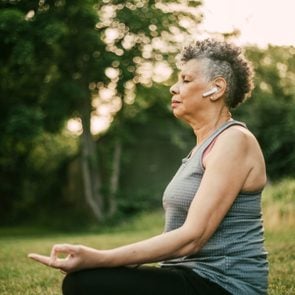9 Free Meditation Apps Experts Love
Updated: Jun. 09, 2021
These free meditation apps can help you find inner peace and reap the many benefits of this mind-body practice.
Meditation apps can promote mindfulness
Meditation is having a moment, and if current trends continue, this age-old mind-body technique could become a standard treatment for mental health issues like stress and anxiety.
In the past year alone, use of meditation apps has skyrocketed, likely because of the Covid-19 pandemic and the fear, stress, and anxiety it’s added to our daily lives.
It’s a billion-dollar industry that’s only expected to get bigger. Market research firm Data Bridge estimates that by 2027 the meditation market will grow to $9 billion.
Meditation is an umbrella term for a set of techniques that encourage a heightened state of consciousness, largely by focusing on the present moment.
It promises a lengthy list of potential mental and physical health benefits, including lower blood pressure; less anxiety, stress, and depression; and decreased pain. It may even slow aging.
Free apps and courses are readily available to teach you how to meditate and help you cultivate your practice.
However, all of the tools you need are already inside of you—namely your breath and five senses, says Neda Gould, director of the mindfulness program at Johns Hopkins University in Baltimore.
That said, she says apps can help you access these internal tools and maximize their use.
Once you choose an app to download, you will also need a quiet spot that is free from distractions, a comfortable sitting spot, and an open mind. Remember, how long you meditate is not as important as how often you do it.
“Try to find some space in your home where you won’t be disturbed, and practice along with the apps or on your own,” suggests Diana Winston, director of mindfulness education at the University of California-Los Angeles’ Mindful Awareness Research Center and the author of The Little Book of Being.

Best meditation apps
The free meditation apps below offer a starting point for your path to inner bliss.
The best part: they’re free. For more mental health help, check out the best therapy apps, according to experts.
Calm
This is the No. 1 meditation app for a good reason: a 2019 study published in the JMIR mHealth and uHealth shows it can help college students turn down their stress levels and learn to be more mindful.
A study published in January 2021 issue of PLOS One provides more reason to try Calm.
When people who had difficulty getting a good night’s sleep practiced guided mindfulness meditations with the app for eight weeks, they were less tired during the day and had less trouble falling asleep at bedtime compared with their counterparts who were placed on a wait-list.
“All of my patients love Calm,” says Beth King, an associate professor of nursing at Florida Atlantic University’s Christine E. Lynn College of Nursing in Boca Raton, Florida.
Though the app is free, additional in-app purchases are also available.
(Try these breathing exercises for relaxation.)
Headspace
This fan favorite earned the highest average score (four out of five) in a JMIR mHealth and uHealth study.
Researchers evaluated the quality of mindfulness-based apps using the Mobile Application Rating Scale to assess engagement, functionality, visual aesthetics, and information quality.
Headspace teaches users the basics of meditation and mindfulness with exercises guided by experts.
The app is free with available in-app purchases. The Headspace Plus subscription ($12.99 per month) unlocks access to meditation exercises for sleep, focus, and exercise.
Healthy Minds Program
The Healthy Minds Program is free and offers meditation practices aimed at enhancing awareness, connection, insight, and purpose, says Cortland Dahl, chief contemplative officer at Healthy Minds Innovations and a research scientist at the Center for Healthy Minds at the University of Wisconsin-Madison.
Awareness meditations focus on becoming more mindful and attentive to the present, while connection meditations are based on fostering kindness and appreciation.
“Insight meditations are great to do at the end of the day, as they challenge you to notice and question your negative assumptions about yourself,” he says.
Purpose-driven meditations help to set and manifest intentions. “You can decide to make this day about kindness or leaving the world better than you found it,” he says. “Make it something bigger than yourself.”
Insight Timer
This app from Insight Timer offers more than 80,000 free meditations across many schools, including mindfulness and loving-kindness, or metta meditation.
This involves directing well-wishes to others and channeling feelings of gratitude and compassion, says Gould.
It also features guided meditations and lessons from some of the biggest names in the wellness biz, including Jack Kornfield, Tara Brach, Sharon Salzburg, and Rhonda Magee.
Insight Timer also offers a free seven-day course to help you get started and master the basics. There are in-app purchases available to dive deeper.
(Here are some mindfulness quotes to help quiet your mind.)
Smiling Mind
This top-rated mindfulness app was initially created for children, so it has lots of kid-friendly meditations along with many for adults.
Mindfulness meditation aims to shift your attention and focus to the here and now, often with breathwork.
Smiling Mind offers meditations aimed at better sleep, digital detox, stress management, and more.
Ten Percent Happier
Winston is a fan of Ten Percent Happier, an app with more than 500 guided meditations for everything from anxiety and parenting to increasing your focus and getting better sleep.
It is based on the book by TV anchor Dan Harris and is geared toward newbies and skeptics.
It’s free, though in-app purchases are available.
TM Community
This is a free app, but only if you have taken the paid transcendental meditation course. (The cost of the class is based on a sliding scale, and financial aid is available.)
TM Community involves repeating a personalized mantra, and it calls for practicing 20 minutes, twice a day.
In addition to meditations, the app includes a community element, featuring online and local meditation events.
UCLA MARC App
This free app offers mindful meditations from the UCLA Mindfulness Awareness Research Center.
It also includes videos on how to start a practice and a timer to meditate on your own, among other features.
“On our UCLA app, you can start with a five-minute meditation and slowly increase over time to 15 minutes or an amount that makes sense in your life,” says Winston.
Virtual Hope Box
“This app is excellent and came out of the Veteran’s Affair system,” King says. “It was originally used for veterans, but now a lot of patients have it downloaded.”
The Relax Me section in the Virtual Hope Box app teaches controlled breathing, muscle relaxation, and guided meditation.
Next, here’s how to practice daily meditation.















